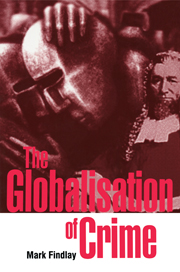Book contents
- Frontmatter
- Contents
- Preface
- Acknowledgements
- Introduction: Notions of context and globalisation
- 1 (Mis)representing crime
- 2 Crime and social development
- 3 Crime and social dysfunction
- 4 Marginalisation and crime relationships
- 5 Crime economies
- 6 Crime as choice
- 7 Integrating crime control
- Epilogue
- Bibliography
- Index
Preface
Published online by Cambridge University Press: 22 September 2009
- Frontmatter
- Contents
- Preface
- Acknowledgements
- Introduction: Notions of context and globalisation
- 1 (Mis)representing crime
- 2 Crime and social development
- 3 Crime and social dysfunction
- 4 Marginalisation and crime relationships
- 5 Crime economies
- 6 Crime as choice
- 7 Integrating crime control
- Epilogue
- Bibliography
- Index
Summary
Crime cannot be understood outside its social context. For the analysis which follows context is viewed as physical space, institutional process, patterns of relationships and individual variation. Context is a transitional state within which crime influences, and is influenced by, a variety of social, cultural, political and economic determinants.
Contextual analysis is essentially interactive. As an object of such analysis crime is not limited to people or situations or reactions. Crime is more effectively understood as relationships which develop along with the dynamics of its selected context. Essential for the motivation of these relationships is the representation of crime as choice.
In order to appreciate crime beyond its localised manifestations, a contextual analysis needs to be comparative at many levels. The identified interest in globalisation suggests several dualities (local/global; custom/modernisation; market/enterprise) which dominate the comparative contextual analysis to follow. Initially the comparison will be within context (e.g. crime as a feature of social development internal to a particular transitional culture). Concurrently the comparison of context with context (e.g. locality and globe) will evolve. The latter holds out much for critically appreciating the representations of crime and the interests which promote them.
To achieve its fullest potential within the theme of globalisation, comparative research should, therefore, concentrate within a nominated cultural context; across two or more contexts within the same culture; across time and space within a culture in transition; culture to culture; and (not or) simultaneously at the local and global levels.
- Type
- Chapter
- Information
- The Globalisation of CrimeUnderstanding Transitional Relationships in Context, pp. vii - ixPublisher: Cambridge University PressPrint publication year: 1999
- 1
- Cited by



